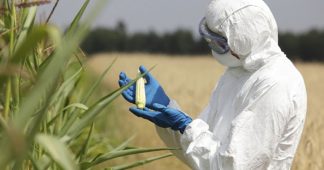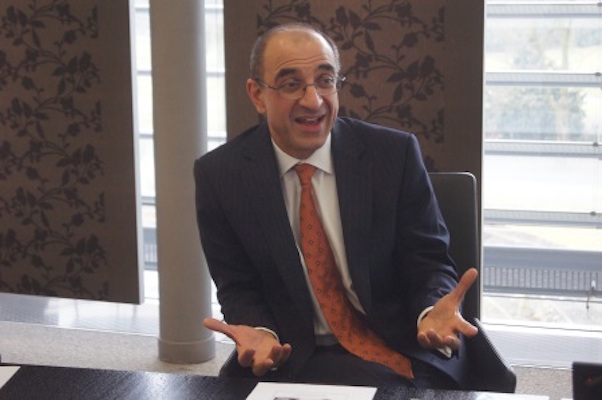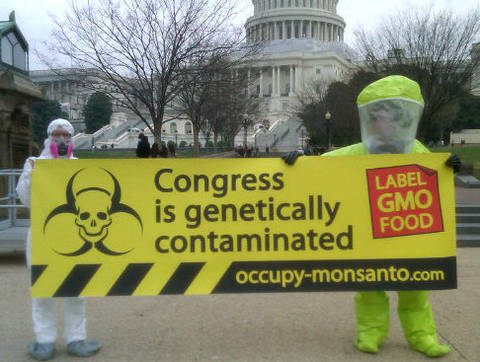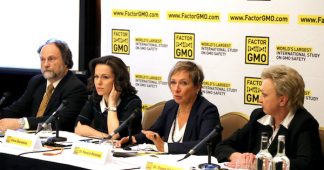Colin Todhunter
February 12, 2018
Richard John Roberts is a prominent biochemist and molecular biologist. On his recent visits to India, he has talked about the supposed virtues of genetically modified (GM) food and crops, while attacking people who have valid concerns about the technology.
In 2015, while in Mysore, he implied the denial of GM food to people in developing nations is a crime against humanity. He also argued that the present engineering of GM crops is precise and is little different from conventional breeding.
Roberts has claimed on more than one occasion that “millions of people in the third world would die” of starvation unless GM crops are introduced and that Greenpeace is in the business of scaring people and should be put on trial for crimes against humanity.
As a Fellow of the Royal Society, Roberts should be aware of the Society’s misleading and exaggerated statements that it has used to actively promote genetically modified organisms (GMOs) since the mid-1990s. Unfortunately, Roberts himself reads from a similar script.
In an open letter to the Royal Society, author of ‘Altered Genes, Twisted Truth’ Steven Druker argued that the scientific institution has engaged in a campaign of disinformation and the smearing of credible research that has showed firm evidence pointing to health dangers of GM. He added there is not now nor never has been a consensus within the scientific community that GM foods are safe.
The World Health Organization cautions that “Different GM organisms include different genes inserted in different ways. This means that individual GM foods and their safety should be assessed on a case-by-case basis and that it is not possible to make general statements on the safety of all GM foods.” Renowned geneticist Mae-Wan Ho has addressed the “central dogma” of molecular biology, which provides a “simplistic picture” of the precision involved in GM.
In 2018, Roberts has been in India again. In a short interview, he agrees that GM mustard should be introduced to ease the edible oil import bill and then goes on to attack critics of GM:
“Bt cotton has been incredibily successful…very popular, good for the economy, get better yields… there’s just no reason not to be doing this… The rest of the world really needs them [GMOs]… by trying to pretend that they are dangerous, they are actively killing people. I think it’s just disgusting.”
Baseless claims: GM mustard and cotton
Campaigner Aruna Rodrigues says Roberts’s statements on GM cotton are just plain fabrications. She adds that there is no science nor integrity in what he says, and he has no understanding of the Indian context:
“GMOs are self-replicating organisms and genetic contamination of the environment, of non-GM crops and wild species through gene flow, is certain: it cannot be contained, reversed, remedied or quantified. Our seed stock will also be contaminated at the molecular level. Any toxicity that there is will remain in perpetuity. The traits for disease, saline and drought resistance, yield, etc. are found in nature, not biotech labs. We must maintain India’s still-rich genetic diversity for the future of our agriculture.”
It must be re-iterated that India’s edible oils import bill has risen not because the indigenous sector is unproductive and thus needs GM mustard to boost yields (it has no GM trait for improved yield and is anyhow outperformed by existing non-GM varieties). Until the mid-1990s, India was virtually self-sufficient in edible oils. Then import tariffs were reduced, leading to an influx of cheap (subsidised) edible oil imports that domestic farmers could not compete with. This devastated the home-grown edible oils sector. Roberts seems ignorant of this basic fact. It is essentially a trade policy issue which proponents of GM misrepresent.
Rodrigues has gone to the Supreme Court to seek a moratorium on the release of any GMOs in India in the absence of comprehensive, transparent and rigorous biosafety protocols and biosafety studies conducted by independent expert bodies. A recent report (p.5) by the Parliamentary Standing Committee on Science & Technology, Environment and Forests is scathing in its criticism of the regulation and risk assessment of GMOs in India, including GM mustard. The Committee strongly believes that, given the situation, no GM crop should be introduced into the country. This report is entirely in agreement with four previous official government reports.
In her various submissions to the Supreme Court, Rodrigues has made it clear – supported by a good deal of data – that GM mustard does not improve yields and that there is in fact no need for it. Field trails have been based on invalid tests, secrecy, poor science and a lack of rigour and there has been an outright case of unremitting fraud and regulatory delinquency.
From the issue of labelling GM food to ‘substantial equivalence’, the science around GM in general has been distorted, debased and bypassed to serve commercial interests. Not a single long-term epidemiological study has been conducted with GMOs despite claims about ‘safety’.
As far as GM cotton in India is concerned, despite what Roberts claims, Rodrigues’s evidence to the Supreme Court makes it patently clear that yields have stagnated and insecticide use has increased to pre-GM cotton levels as new highly damaging pests have emerged and pest resistance to the technology is spreading. Add to that the high costs of GM seed, continued insecticide use and usury costs and the situation has become economically devastating for poor farmers and is likely the proximate cause of the increase incidence of suicides.
The myth that GM will feed the world
GM crops that are on the market today are not designed to address hunger. Four GM crops account for almost all of worldwide GM crop acreage, and all four have been developed for large-scale industrial farming systems and are used as cash crops for export, to produce fuel or for processed food and animal feed. Roberts talks about GM being necessary for feeding the hungry millions, yet GM crops deliver no traits for yield.
Consider that “GM crops have not consistently increased yields or farmer incomes or reduced pesticide use in North America or in the Global South (Benbrook, 2012; Gurian-Sherman, 2009)” (from the report ‘Persistent narratives, persistent failure’). Consider too that GM agriculture is not ‘feeding the world’, as described in the 2016 New York Times piece ‘Broken promises of GM crops’. Evidence shows that, across the globe genetic engineering has not increased the yield of a single crop.
Numerous high-level reports have argued that to feed the hungry in poorer regions like India we need to support diverse, sustainable agroecological methods of farming (not GM) and strengthen local food economies. Agroecological approaches account for the ecological aspects of agriculture, including the building of soil fertility, the need to ensure biodiversity such as natural pest enemies and pollinators and the genetic diversity of crops and breeding and adapting crops to local or regional agroecological conditions. All the things that chemical-intensive industrial agriculture has undermined, as underlined in this very revealing open letter to Indian officials by Bhaskar Save, which Roberts should certainly read.
While Roberts makes various fanciful claims about the benefits of GM, they just do not stack up.
Aruna Rodrigues:
“There are promises of GMOs with traits for disease, drought etc., but these are complex, multi-gene traits and remain futuristic. What is abundantly clear is that traditional breeding outperforms GMOs hands down.”
In the report GMO Myths and Truths, the evidence presented shows that conventional breeding continues to outstrip GM in delivering crops that yield well, resist disease, are nutritious and tolerate drought and other types of extreme weather.
Roberts’s approach is just plain reductionist. His attitude to the politics of GM is also one dimensional. It is not Greenpeace or a bunch of green-oriented elitist ideologues that is contributing to world hunger but the power, influence and ambitions of a very wealthy and politically well-connected group agribusiness concerns that is promoting a highly profitable GM technology.
The GM approach and the model of agriculture it is linked to is ecologically unsustainable and upheld by taxpayer handouts: in the US, the average costs of production for (GM) commodity crops is often greater than the price farmers get; farmers rely on subsidies that are often more than the crop value, while most profits in the chain are secured by the seed and pesticide corporations. At the same time, GM has resulted in the increased use of herbicides as well as the coating of most seed with powerful and harmful insecticides and fungicides.
Moving beyond reductionism
For all the talk about GM ‘feeding the world’ and scaremongering about the actions of critics of GM, Roberts opts to sidestep the root causes of hunger and poverty. Eric Holt-Giménez:
“The World Bank, the WTO, the World Food Program, the Millennium Challenge, The Alliance for a Green Revolution in Africa, the US Department of Agriculture and industrial giants like Yara Fertilizer, Cargill, Archer Daniels Midland, Syngenta, DuPont and Monsanto carefully avoid addressing the root causes of the food crisis. The ‘solutions’ they prescribe are rooted in the same policies and technologies that created the problem in the first place: increased food aid, de-regulated global trade in agricultural commodities, and more technological and genetic fixes. These measures only strengthen the corporate status quo controlling the world’s food.”
To serve the interests of these corporations, a number of treaties and agreement over breeders’ rights and intellectual property have been enacted to prevent peasant farmers from freely improving, sharing or replanting their traditional seeds. Large corporations with their proprietary seeds and synthetic chemical inputs have eradicated traditional systems of seed exchange. They have effectively hijacked seeds, pirated germ plasm that farmers developed over millennia and have ‘rented’ the seeds back to farmers. As a result, genetic diversity among food crops has been drastically reduced, and we have bad food and diets, degraded soils, water pollution and scarcity and spiralling rates of poor health.
The Food and Agriculture Organization of the United Nations estimates that globally just 20 cultivated plant species account for 90% of all the plant-based food consumed by humans. This narrow genetic base of the global food system has put food security at serious risk.
The corporate-dominate industrial model is not only an attack on biodiversity and – as we see the world over – on the integrity of soil, water, food, diets and health but is also an attack on the integrity of international institutions, governments and officials which have too often been corrupted by powerful transnational corporations.
It is very convenient for Roberts to ignore issues surrounding international trade policy, inappropriate development strategies, the impacts of commodity market speculation, sovereign debt repayment issues, land speculation, the nature of export-oriented monocropping, sustainable agriculture, fluctuating oil prices, the dynamics of structural inequality and poverty or any of the other issues that impact global and regional food security and which create food deficit areas and fuel hunger and malnutrition.
Perhaps it is convenient for him to overlook all of the above issues, which in reality, not in the fantasy world of a pro-GMO lobbyist, determine humanity’s ability for feeding itself effectively and properly.
It certainly does not lie in an already failed pesticide resistant GM plant technology in India or herbicide resistant plants which would be wholly inappropriate for a dominated by small multi-cropping farms.
Aruna Rodrigues:
“There is serious concern that Monsanto may have known for 30 years that glyphosate is an endocrine (hormone) disruptor; no regulatory agency anywhere regulates for endocrine disruption despite overwhelming evidence from Argentina of horrendous birth defects because of glyphosate used in herbicide-tolerant (HT) soybeans. In this context, Bayer’s glufosinate, the herbicide linked with Indian HT mustard, is an acknowledged neurotoxin banned in the EU. The Supreme Court-appointed Technical Expert Committee recommended a ban on any HT crop in India for this among several other reasons.”
The globalised industrial food system that transnational agribusiness promotes is not feeding the world, has destroyed rural economies and is responsible for some of the planet’s most pressing political, social and environmental crises.
But for Roberts to acknowledge any of this would derail his agenda. What many might find “disgusting” is a scientist who ignores available evidence to lobby for GM and seems unable or unwilling to come to terms with the wider issues. Willful ignorance is no excuse for promoting inappropriate technology in India or for denigrating critics who have valid concerns.











